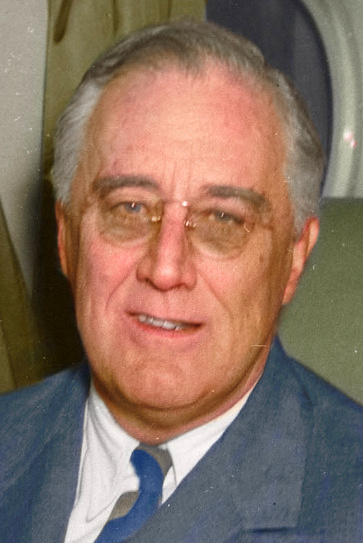
Address by Vice President Wallace
July 20, 1944
As chairman of the Iowa delegation, I am deeply honored to second the nomination of the greatest living American – Franklin D. Roosevelt. The strength of the Democratic Party has always been the people – plain people like so many of those here in this convention – ordinary folks, farmers, workers and businessmen along main street. Jefferson, Jackson and Woodrow Wilson knew the power of the plain people. All three laid down the thesis that the Democratic Party can win only if and when it is the liberal party.
Now we have come to the most extraordinary election in the history of our country. Three times the Democratic Party has been led to victory by the greatest liberal in the history of the United States. The name Roosevelt is revered in the remotest corners of this earth. The name Roosevelt is cursed only by Germans, Japs and certain American troglodytes.
The first issue which transcends all others is that complete victory be won quickly. Roosevelt, in a world sense, is the most experienced military strategist who has ever been President of the United States. Roosevelt is the only person in the United States who can meet on even terms the other great leaders in discussions of war and peace. The voice of our new world liberalism must carry on.
It is appropriate that Roosevelt should run on the basis of his record as a war leader. He is successfully conducting a war bigger than all the rest of our wars put together. He must finish this job before the nation can breathe in safety. The boys at the front know this better than anyone else.
The future belongs to those who go down the line unswervingly for the liberal principles of both political democracy and economic democracy regardless of race, color or religion. In a political, educational and economic sense there must be no inferior races. The poll tax must go. Equal educational opportunities must come. The future must bring equal wages for equal work regardless of sex or race.
Roosevelt stands for all this. That is why certain people hate him so. That also is one of the outstanding reasons why Roosevelt will be elected for a fourth time.
President Roosevelt has long known that the Democratic Party in order to survive must serve men first and dollars second. That does not mean that the Democratic Party is against business – quite the contrary. But if we want more small businessmen, as the Democratic Party undoubtedly does, we must modify our taxation system to encourage risk capital to invest in all rapidly growing small business.
We want both a taxation system and a railroad rate structure which will encourage new business and the development of the newer industrial regions of the South and West. Rate discrimination must go.
The Democratic Party in convention assembled is about to demonstrate that it is not only a free party but a liberal party. The Democratic Party cannot long survive as a conservative party. The Republican Party has a monopoly on the conservative brains and the conservative dollars. Democrats who try to play the Republican game inside the Democratic Party always find that it just can’t work on a national scale.
In like manner Republicans who try to play the Democratic game inside the Republican Party find that while it may work on a state basis it can never work nationally. I know because my own father tried it. Perhaps Wendell Willkie may have learned in 1944 a little of that which my own father learned in 1924. The old elephant never changes and never forgives.
By nominating Franklin Roosevelt, the Democratic Party is again declaring its faith in liberalism. Roosevelt is a greater liberal today than he has ever been. His soul is pure. The high quality of Roosevelt liberalism will become more apparent as the war emergency passes. The only question ever in Roosevelt’s mind is how best to serve the cause of liberalism in the long run. He thinks big. He sees far.
There is no question about the renomination of President Roosevelt by this convention. The only question is whether the convention and the party workers believe wholeheartedly in the liberal policies for which Roosevelt has always stood.
Our problem is not to sell Roosevelt to the Democratic Convention but to sell the Democratic Party and the Democratic Convention to the people of the United States.
The world is peculiarly fortunate that in times like these the United States should be blessed with a leader of the caliber of Roosevelt. With the spirit of Woodrow Wilson, but avoiding the pitfalls which beset that great statesman, Roosevelt can and will lead the United States in cooperation with the rest of the world toward that type of peace which will prevent World War III. It is this peace for which the mothers and fathers of America hope and work.
Issues that will be with us for a generation – perhaps even for a hundred years – will take form at this convention and at the November election. The Democratic Party and the independent voters will give Roosevelt their wholehearted support because of his record in peace and war.
As head of the Iowa delegation, in the cause of liberalism, and with a prayer for prompt victory in this war, permanent peace and full employment, I give you Franklin D. Roosevelt.
